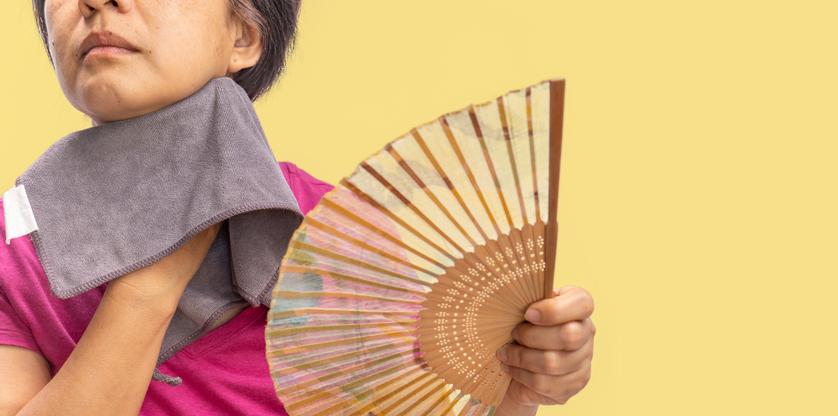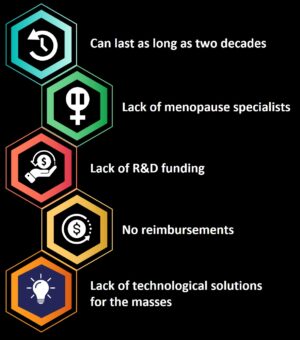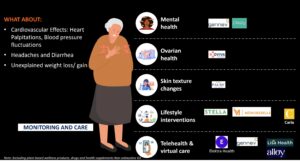
Women’s health issues are finally getting attention, and the stigma around menstruation is beginning to lift. Femcare, or period products and wellness solutions for women, has gained significant momentum in recent years, especially after the term “Femtech”—female technology—was coined in 2017. Reproductive care support, including fertility solutions, is also gaining steam. But one of the biggest areas that has been side-stepped and forgotten is tied to aging and change of life: menopause. Menopause is a routine life event that marks the end of the menstrual cycle. The care surrounding it, however, is anything but routine. This condition and its related mental health are a major stigma in our society, and it’s time to discuss what should be done about a woman’s life stage that runs for over two decades with 38 different symptoms.
Femtech has gained prominence in investor and corporate circles over the past few years. Currently, there are three unicorns in the space: Maven Clinic, Kindbody, and Elvie, along with Organon, a dedicated women’s health company spun off from Merck. On the medical devices side, Hologic has also dedicated itself to women’s health. These players are approaching the concept from different directions, but what’s the next level of growth?

With the Rise of AI, What IP Disputes in Healthcare Are Likely to Emerge?
Munck Wilson Mandala Partner Greg Howison shared his perspective on some of the legal ramifications around AI, IP, connected devices and the data they generate, in response to emailed questions.
Today, the cure for menopause is ‘tough it out’
Menopause is a life condition that needs redefinition, reclassification, and a new care model of how it is treated. It was a term developed by Greek philosophers—basically a pause—but its implications on modern-day women with modern lifestyles are long-standing, difficult and at times even debilitating.
Should we start treating menopause as a disease condition? In our view, it’s a chronic disease condition that can go beyond two decades for some women, resulting in silent suffering (Figure 1). Unlike infertility, menopause is currently not a mainstream focus for women’s health.

Figure 1
To highlight the seriousness of the situation, we decided to do a head-to-head comparison between diabetes and menopause, not to undermine the seriousness of diabetes as a chronic disease but to use it as a benchmark to see if menopause should be treated as a chronic condition. The results are quite interesting. There are 4-5 million women diagnosed with diabetes every year (based on global diabetes growth estimates) and 50 million women entering menopause every year (based on a demographic profile of the world population and women entering their 50s each year). But the diabetes care devices market brings in billions in annual revenues, and menopausal care doesn’t even bring in $1 billion.
Looking into the future of both conditions, by 2030, the total menopausal population will reach 1.2 billion, and the total population of women with diabetes will reach 321.5 million, according to the International Diabetes Federation (assuming 50% of diabetics to be women).
According to a survey conducted recently in the US among 2,000 menopausal women, only 6% of the surveyed women were prepared for debilitating symptoms such as hot flashes, sleep disturbances, night sweats, brain fog, increased depression, anxiety, stress, and even low libido. The remaining population continues to suffer in silence. While hormone replacement therapy and over-the-counter solutions exist, they aren’t very effective and come with serious side effects. More importantly, there is a severe lack of menopause specialists, no technology solutions effective for the masses, and no reimbursements for these solutions.
New solutions have emerged to tackle the symptoms of menopause. For example, Embr Labs’ Wave Bracelet instantly provides cooling relief from hot flashes. However, less than a dozen such solutions are available today to help a population of over a billion menopausal women in 2030. Some symptoms and areas of menopause are not even addressed effectively today (dry eye, recurrent urine infections, or even endometrial neoplasia). Indeed, there is a significant opportunity for products and solutions in this space, and a lot more money and funding need to go into this area as well.
The need for holistic care models
The need for holistic healthcare for treating menopause has become paramount. While symptom-based products and solutions are a good first step, every part of the body interacts with each other. The two smallest organs in a woman’s body—the ovary and the uterus—have a huge impact on the functioning of other organs and mental health. Figure 2 shows the need to move the discussion to a holistic care model. Of course, the main question remains: who will treat this chronic condition?

Figure 2
All stakeholders in this ecosystem must support the development and commercialization of effective solutions for effective growth. Partnerships and collaborations have become common in the healthcare industry, and opportunities to serve menopausal women must be explored. Start-ups and academic centers are rife with innovations. How do we commercialize their potential and make a difference in the lives of 1.2 billion women in 2030?
Ultimately, healthcare is headed toward personalized, holistic care. Therefore, menopausal women, whose current needs remain unmet, must be supported with solutions, and cannot remain the largely ignored segment it is today.
Photo: Toa55, Getty Images
Siddharth (Sid) Shah is a Prinicpal Consultant with Frost & Sullivan's MEASA Healthcare practice, and until recently lead the practice's global medtech research program. He has over 11 years of healthcare market research and consulting experience. He has previously conducted wet lab research in stem cells at the Johns Hopkins University, USA. Beyond medical devices, Shah tracks innovations in women’s health, senior care, and radiology artificial intelligence. He holds a Master of Science in Biotechnology from Johns Hopkins University, USA.
Reenita Das is a healthcare futurist and strategist, passionate about changing the healthcare industry. She was voted as one of the top 100 women in Femtech and Healthtech and the top 50 Healthcare strategists to follow in 2021. She has lived and worked in over 10 countries, focusing on healthcare issues and working with the public and private sectors to implement growth change strategies. Das currently serves as Partner and Senior Vice President and is the first woman Partner at Frost & Sullivan. In addition, she is the founder of the GLOW (Growth and Innovation of Women) program.














